Have you woken up to find that your RV windows are covered with condensation? Do you feel like the air in your camper is damp? Maybe you have a mold or mildew smell in your trailer, or you have noticed spots or bubbling on the ceiling or walls.
If you have any one of these problems, it is a good indication that you have a humidity problem in your RV.
Controlling the humidity and moisture inside your camper not only makes for better living conditions, it also protects your RV from costly damage.
Whether you have moisture control problems now or want to prevent them in the future, we have several proven ways to control the humidity in your RV based on our own experiences with condensation problems during our years of RVing.
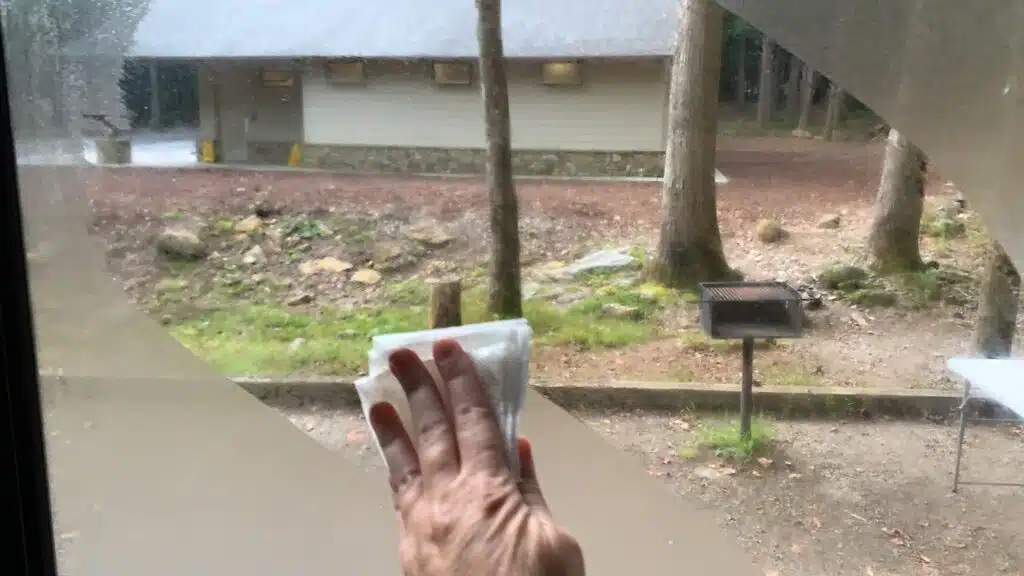
Why Is There Condensation in an RV?
Condensation is water vapor that turns into a liquid on a surface in your trailer or motorhome.
Water vapor comes from a variety of sources throughout the day, such as:
- Cooking
- Showering
- Propane heat
- Humid weather
- Breathing from people and pets in the RV
None of these things are bad or can really be eliminated to stop condensation from building up other than choosing not to camp in humid climates.
As humidity increases, the condensation in your camper increases, which can then lead to mold and mildew, as well as water damage.
RVs have condensation issues more often than homes because of the tiny space, less air flow, different HVAC systems, and a lack of insulation compared to sticks and bricks homes.
That’s why we highly suggest having a moisture control pad underneath your RV mattress.
How to Reduce Condensation in an RV
RV moisture control requires a few steps each day to keep the humidity level low. By making these small changes, you can control the humidity in your RV.
Wipe Condensation Off Windows
Yes, there will be condensation on RV windows sometimes. Do not just sit there and look at it and get upset. You need to remove it!
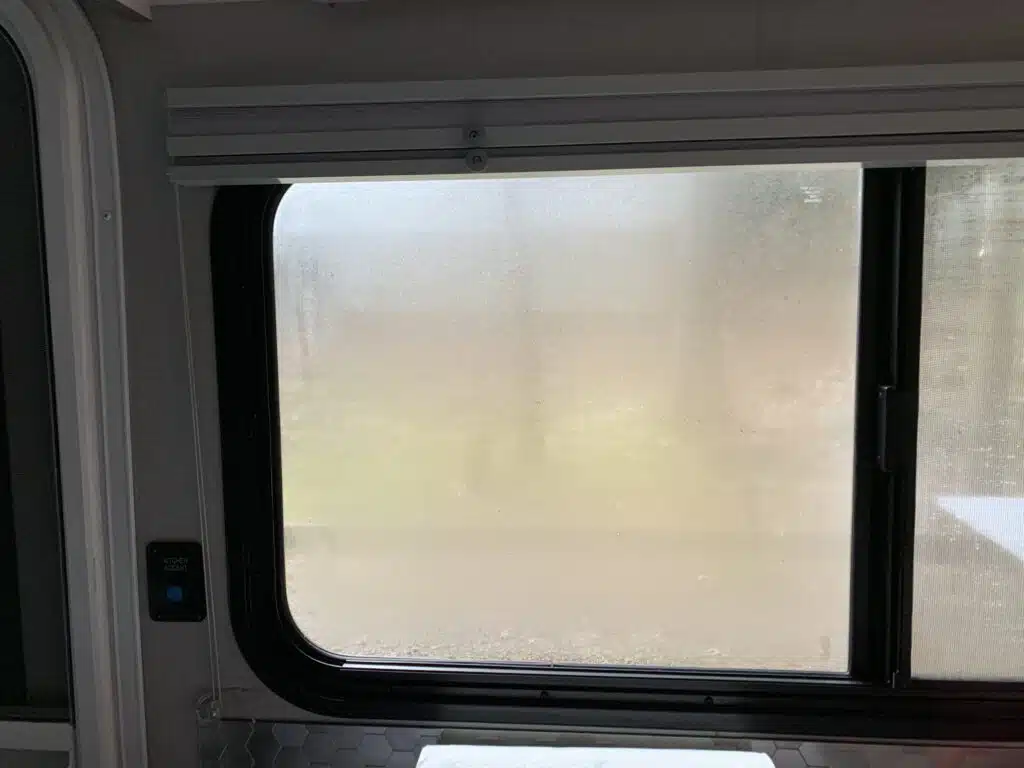
Use a towel or paper towel to wipe off the condensation from your camper windows. Leaving it on the windows will only cause problems.
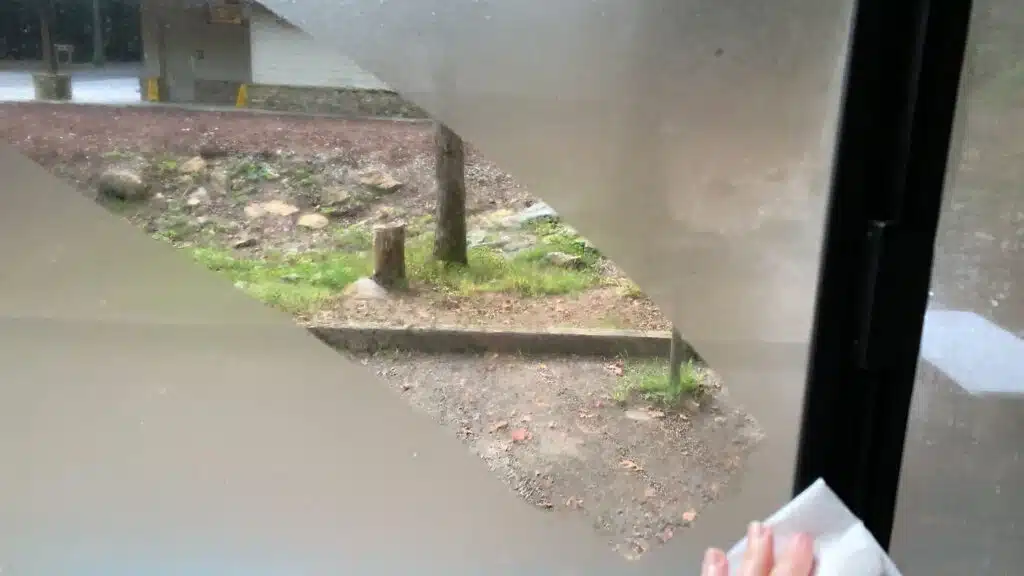
Be sure to put those towels or paper towels outside to either dry out or to dispose of. You don’t want that moisture staying inside your RV.
Use The Exhaust Fans
Every RV has at least one exhaust fan, if not more. These are usually found in or near the bathroom, in or near the kitchen and possibly in the living area.
Maxx Air Fan is one version of the exhaust fans that you will find in campers and trailers. Even if your camper doesn’t have the Maxx Air Fan, it will still have a fan designed to suck out the humid air to the outside while controlling humidity and lowering the temperature inside your rig.
When you shower, always use the exhaust fan during the shower and for 10-20 minutes afterwards. When cooking, use you exhaust fan to allow moisture and steam to escape.
Open Your Windows
If you are camping in a dry environment with no rain or fog in the air, it is best to open the windows and screen doors to let humid air out of your RV.
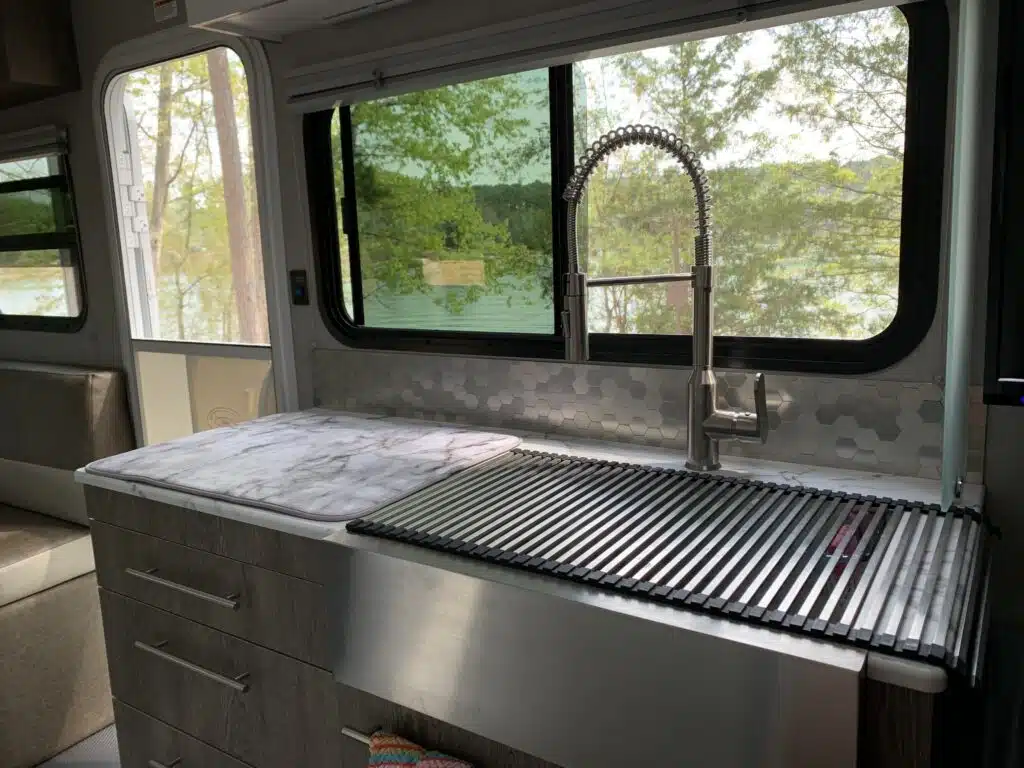
When the weather is foggy or about to rain, humidity levels are higher so you won’t want to open up your windows then unless it is for temperature regulation.
Dry Towels and Clothes Outside
If possible, allow your bath towels, beach towels and other wet clothing, such as bathing suits, to dry outdoors.
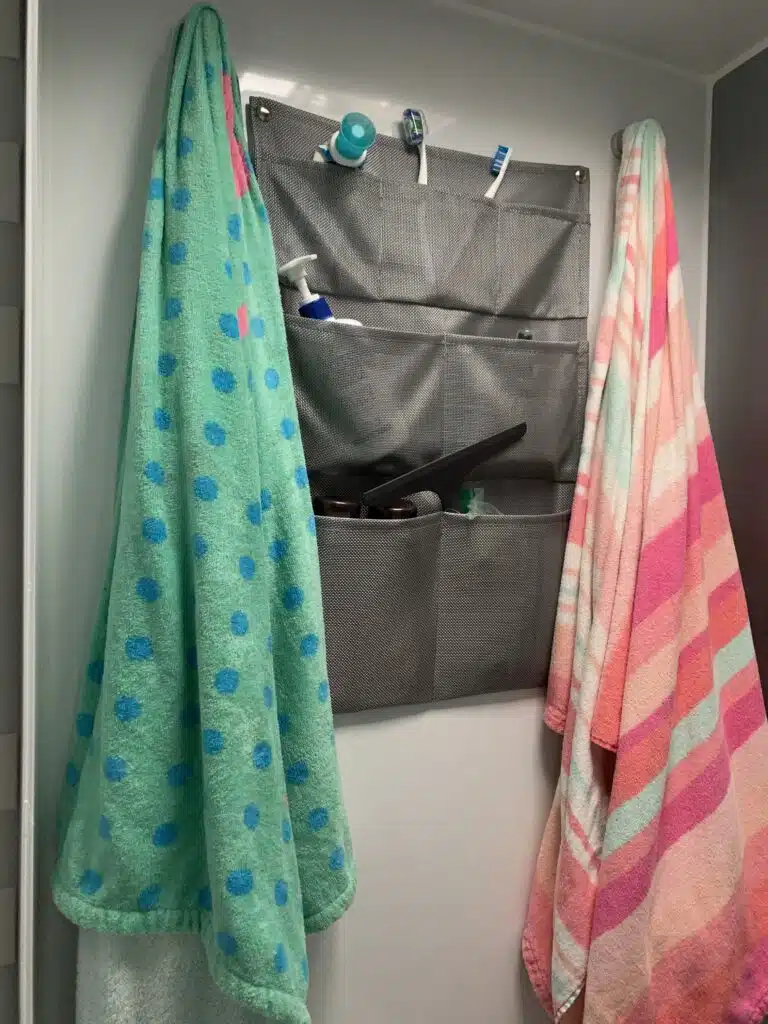
Waiting for these items to dry inside your RV allows the moisture to accumulate in the air and increase the humidity.
Cook Outside
Boiling liquids in pots, steam from an Instant Pot or pressure cooker, and even the hot steam coming out of the oven all contribute to the moisture problem.
When possible, cook outdoors if controlling the humidity in your camper is a challenge.
Use Moisture Absorbers
Small amounts of moisture in the air can be absorbed by moisture absorbers. The wonderful thing about these solutions is that they are a set-in and forget-it option.
We put these moisture absorbers throughout our RV, in cabinets, drawers and on the shelves. They really do work.!
There are a variety of moisture absorbers available, including:
- Activated Charcoal Bamboo Moisture Absorbers that work for several months and can be recharged via sunlight. These non-toxic solutions also absorb odors, which is great if you have a mildew or mold smell.
- Moisture-absorbing bags, cups and boxes such as DampRid. These are disposable, so you can throw them out once the moisture has accumulated. However, you will need to continue buying more.
Run the Fan
While you might not need the air conditioner or heater, you can still run the fan to get air flow moving through your camper.
Moving air can suck out the humid indoor air or help to dry out surfaces with moisture accumulating on them.
So be sure your vents are open.
Run the Air Conditioner
Using the air conditioner is a way to control humidity in an RV.
However, we have found that the air-conditioning in a camper doesn’t work quite as well in controlling humidity as it does in a home or building.
We tried drying out the air in our camper while staying in Florida because everything, including the bedding and pillows, felt damp from the humidity. While running the AC helped us feel cooler, it didn’t really help with reducing the moisture.
Nevertheless, it is wise to use the A/C when camping in hot and humid climates, compared to leaving your windows open for temperature regulation.
Use a Dehumidifier
Dehumidifiers are an excellent way to control the humidity in an RV. You can get small dehumidifiers that draw less energy and are the ideal size for campers.
These electrical appliances do need to be plugged in. You will adjust the settings, depending on how much moisture you want to remove from the air. Then the air is passed through the dehumidifier where the moisture will accumulate in a reservoir and will need to periodically be dumped out.
We used this mini dehumidifier when camping and it works great.
Be careful when buying dehumidifiers because the larger ones often require a drain pipe or they use too much energy for an RV.
Shower Outside
Looking for a good reason to use that outdoor shower attachment on your RV? You can shower outdoors to keep a lot of the moisture and humidity out of your camper.
Or, use the showers in the bath house at your campground.
Don’t Travel to Humid Climates
While it’s not always possible, you may want to avoid traveling to hot and humid climates, especially in the Southeast and Northwest, when the weather is very humid.
During a week-long stay in Orlando in November, we were surprised at how humid it was! Our trailer was dripping with condensation inside because the nights were cold and the days were hot. The sheets and pillows were constantly damp with moisture.
You can’t predict the weather, and sometimes you can’t change travel plans. However, if you have a hard time controlling the humidity in your camper, then you might want to only visit hot and dry destinations, such as the Southwest U.S.
Open Windows on Travel Days
When we traveled on dry, hot days, we would leave the Maxx Air vent slightly open (because we had installed the cover seen in our YouTube video below). We also allowed some of the windows that slid open, rather than opened outwards, to stay open just a few inches.
With this air flow, it really helped to dry out the inside of the RV during the day when we weren’t inside.
We can’t suggest that you definitely do this because we don’t know what your vent fans look like or how your windows operate. We are just sharing what we did when we knew that rain was not in the forecast on a travel day.
